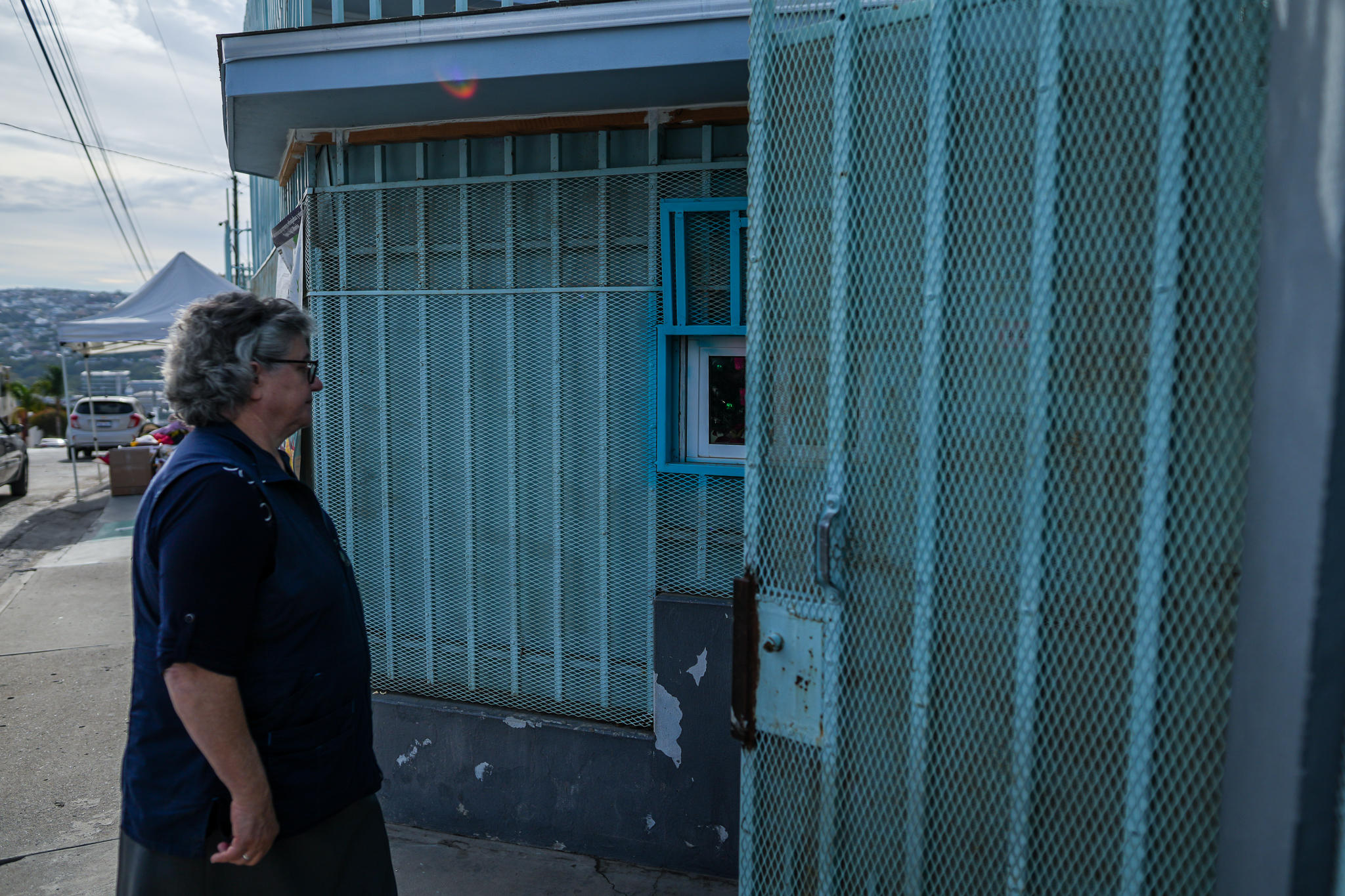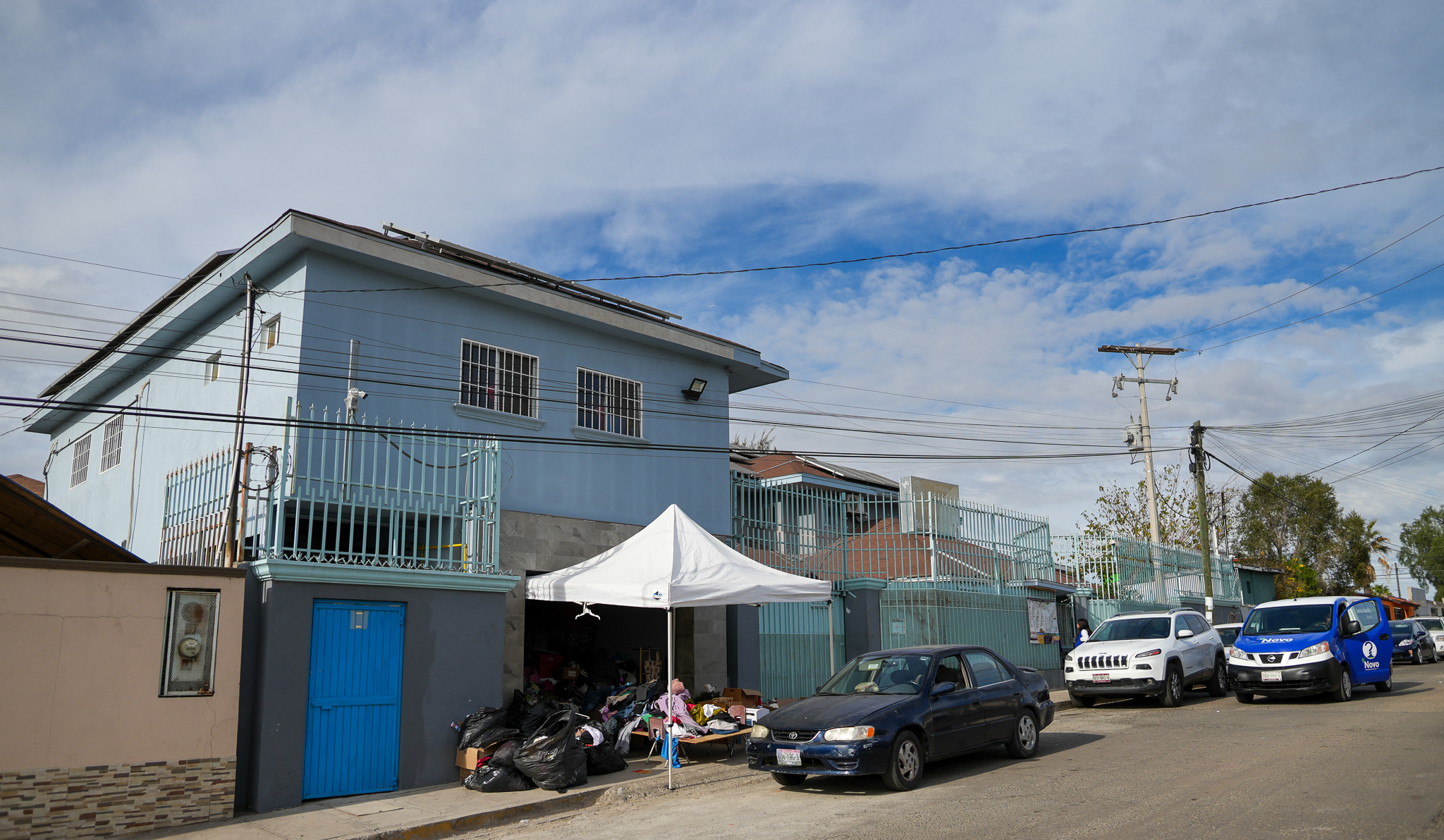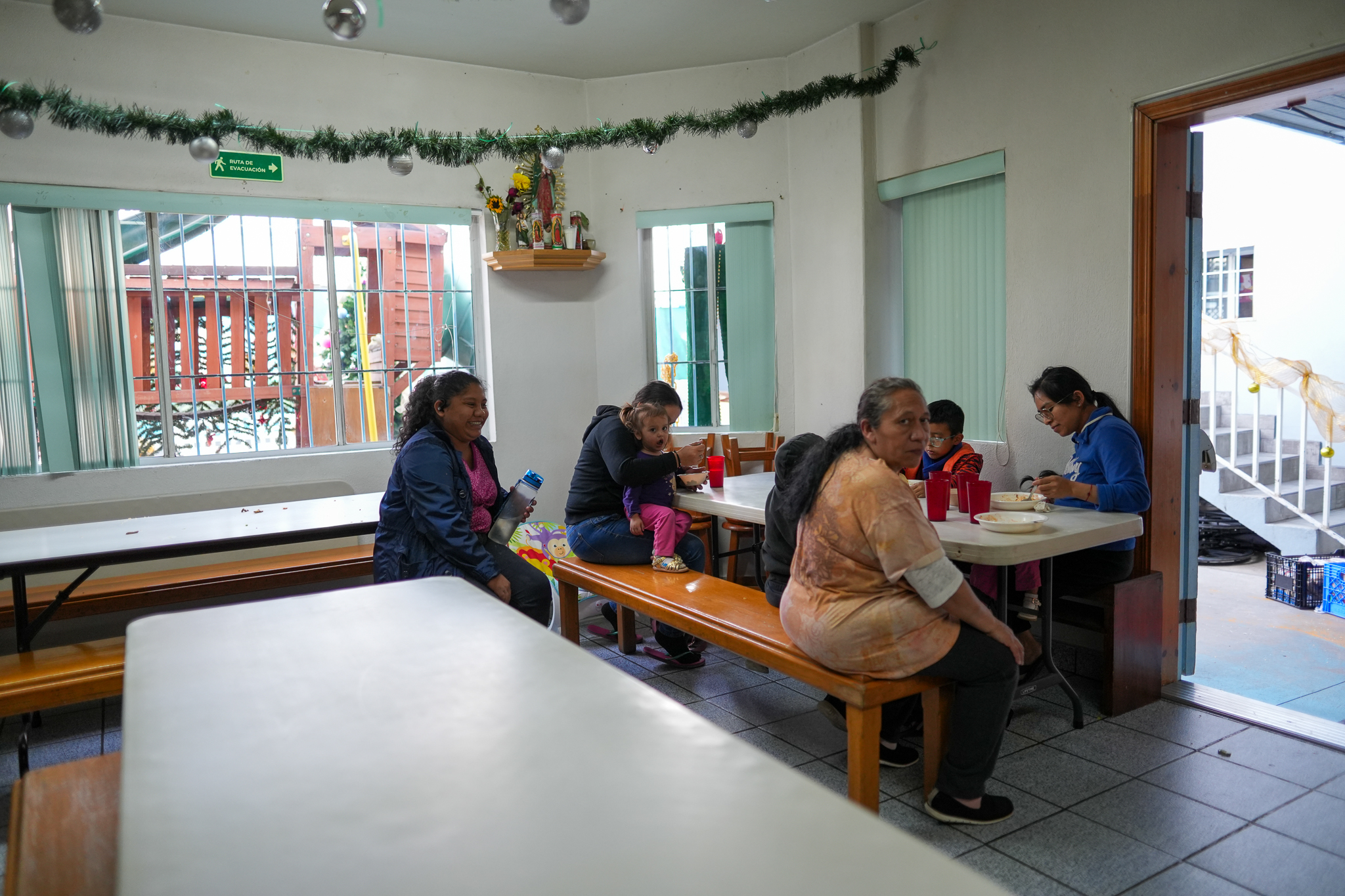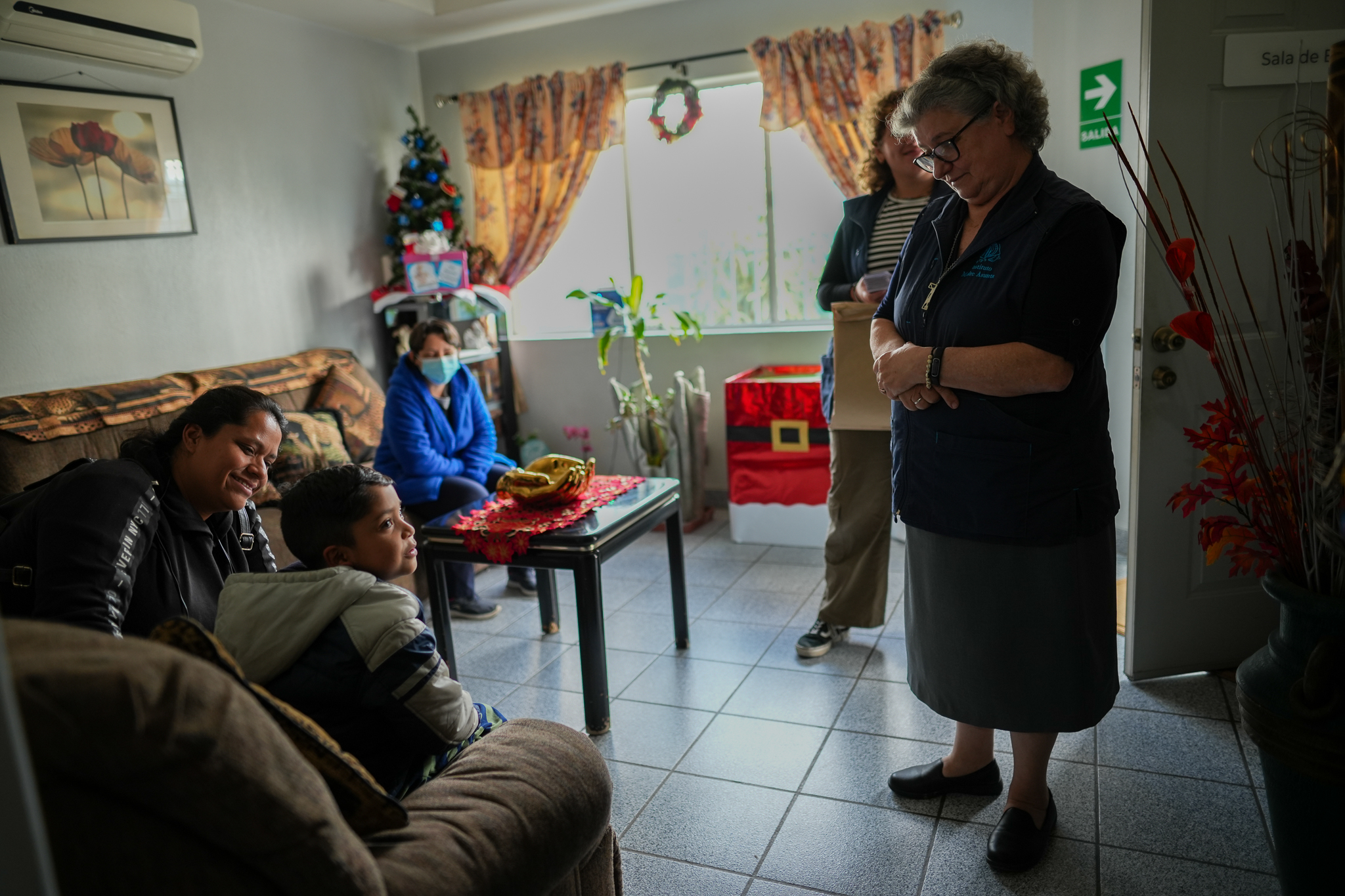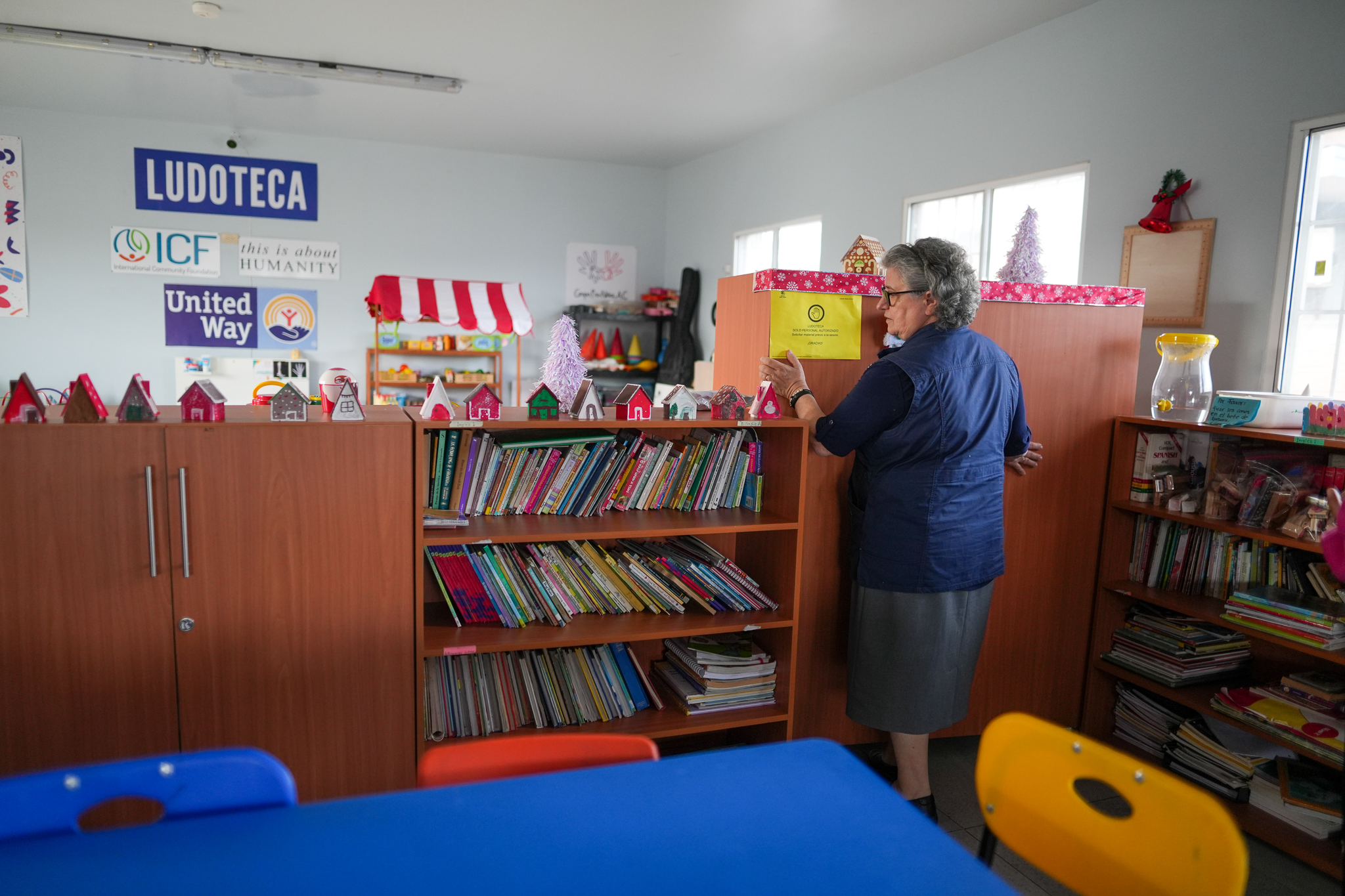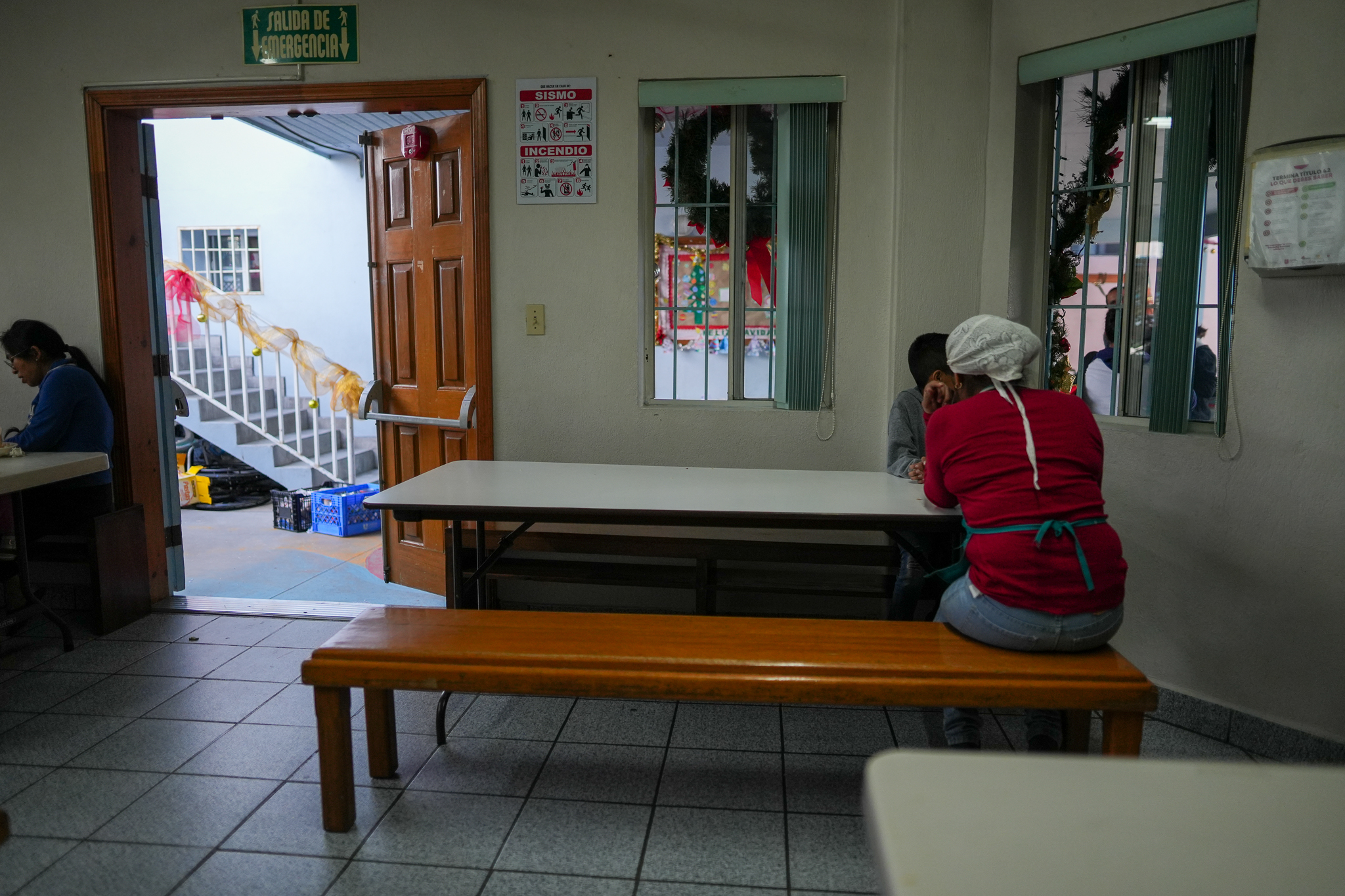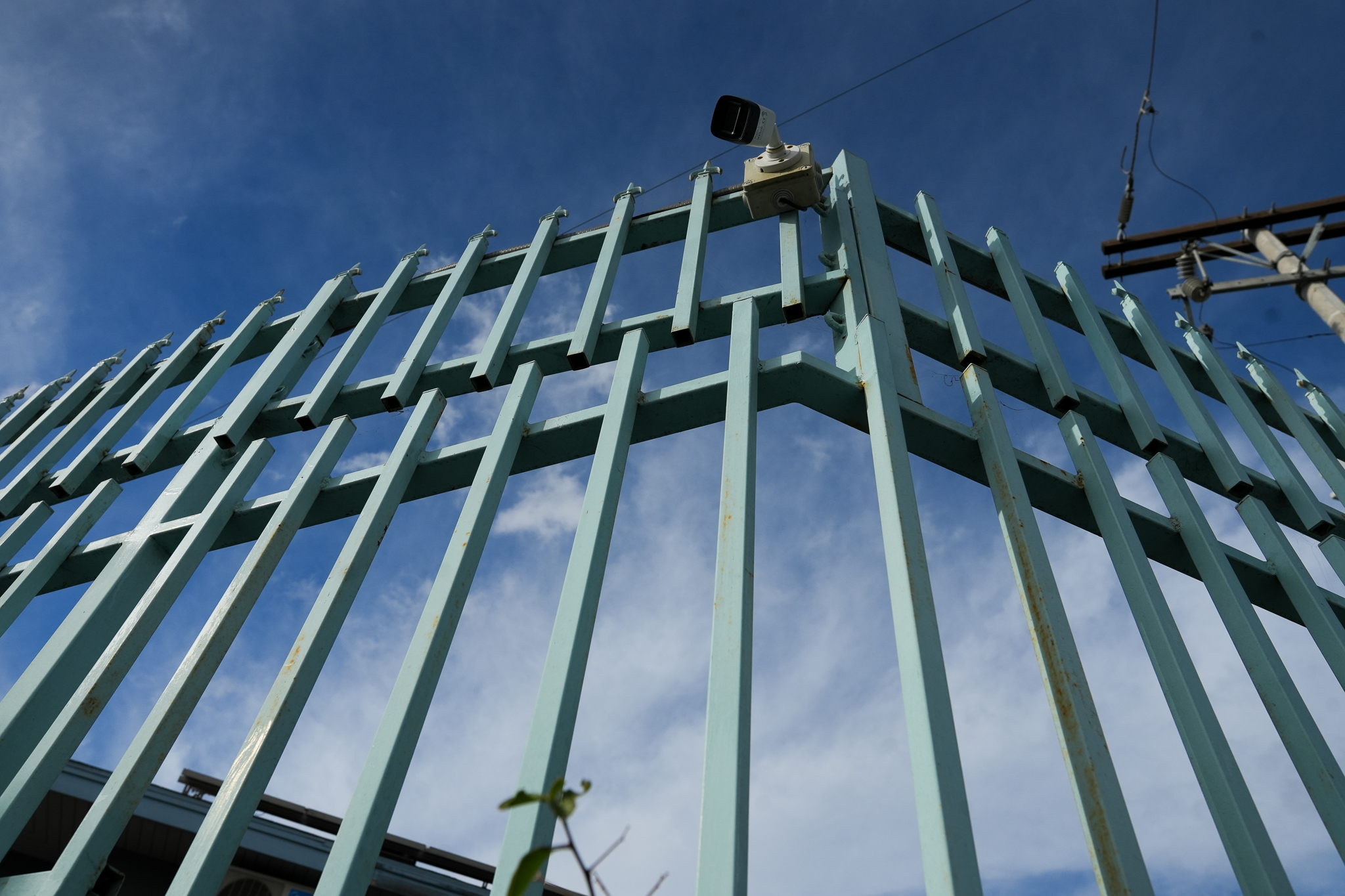
The Scalabrinian Sisters have had to take extreme measures for protection and security at the Instituto Madre Asunta shelter, barricading the facilities and installing surveillance cameras, due to the increase in violence against migrants. (Jorge Nieto)
Sr. Albertina María Paoletti, director of the Instituto Madre Asunta shelter in the city of Tijuana, looks out a window and sees how violence has forced a change in the appearance of what before was a blue house with white roofs, to a kind of fortress with metal bars and surveillance cameras, where women and their children feel safe.
For Paoletti, a member of the Missionary Sisters of St. Charles Borromeo (also known as Scalabrinian Sisters), the safety of the facility and the migrant women has become a priority since she became director March 20, 2020.
Sr. Albertina Paoletti, director of the Instituto Madre Asunta, reveals that they had to "close everything" due to pressure from groups seeking to capture migrants staying at the shelter. "This is the result of violence and organized crime," she said.
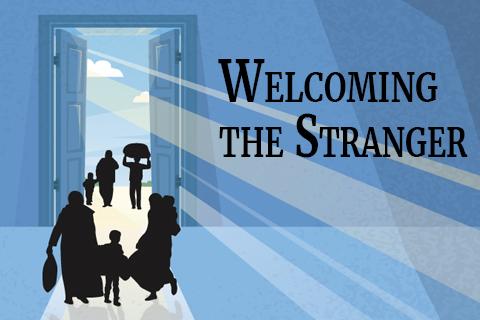
The sister speaks of a time before the pandemic when things looked different, but then violence forced them to seal the fence, becoming a kind of flier with a message to the outside world: "We are separated from the world."
"The pandemic ended and that is when the issue of violence began, when families arrived who were persecuted and they came looking for them right here," said the Scalabrinian sister, adding, "We had to close everything," meaning not accept new migrants or make contact with outsiders. "This is the result of violence and organized crime."
Thousands of migrants are forced to leave their countries because of armed conflict, political persecution, war, hunger, and other factors; some of them pay up to $4,500 to reach the border, said National Institute of Migration delegate David Pérez Tejada in an interview with Global Sisters Report.
Human traffickers — typically organized gangs — offer them a "package" that includes airline tickets, lodging, food and the "border crossing," said Pérez Tejada, as migrants tell the institute in interviews.
The Embajada Migrante shelter, in Tijuana, Mexico, closed in November 2023 after an armed group attacked its facilities, threatened the migrants who were there, and extorted a payment of $200 from them.
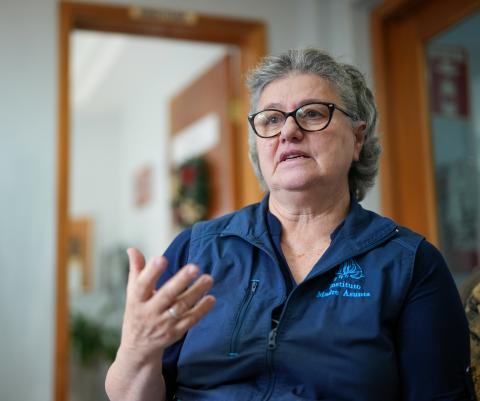
"Everyone knows who the coyotes are, where they pass through, what their routes are, how much they charge or how much they pay, because they also pay those to cross who will follow," said Sr. Albertina Paoletti. (Jorge Nieto)
Paoletti recalled particular stories that forced her to make the decision to reinforce the fences and install security cameras, like the case of a migrant woman who was at the gate one night with her mask on.
"A guy arrived showing a photograph on his cellphone and said, 'I'm looking for this person'; and it was her, but he didn't recognize her," the sister said, adding that the man, who displayed two teardrop tattoos, finally left just before the police were called.
In May 2022, there was an armed confrontation outside the Agape shelter, where a bullet wounded a migrant woman who was inside.
A survey by the Colegio de la Frontera Norte and the International Organization for Migration reveals that between July and November 2022, 69,110 Mexican nationals were returned by U.S. authorities to their Mexican partners. Of that number, 45% of those surveyed reported having used the services of "coyotes" to cross the border.
In 2023, the secretary of security and citizen protection in Tijuana, José Fernando Sánchez González, responded to several emergency reports in one of the 33 shelters for migrants registered in the city. However, he expressed that his experience does not align with Paoletti's perception.
"We do not have a security program for migrant shelters," Sánchez González told GSR, adding, "It is very rare to have an emergency call from a shelter; there are two or three a year, maybe." What does exist, according to the public official, is a technology system for the protection of human rights defenders and activists, such as a pastor who has "the emergency button on his cellphone and a panic button in the shelter."
According to some activists — such as the director of Casa del Migrante, Fr. Pat Murphy, and the director of the Agape Misión Mundial shelter, Albert Rivera — attacks have increased, but the interpretation of the phenomenon is different for the authorities. In May 2022, for example, there was an armed confrontation outside the Agape shelter, where a bullet wounded a migrant woman who was inside. However, for Sánchez González this cannot be counted as a deliberate attack against the shelter or the migrant population. By definition, he said, "a stray bullet cannot be considered an attack on the shelter."
During 2023, there was another shooting outside the Embajadores de Jesús shelter in the south of the city, where an armed individual opened fire on the building from outside. Similarly, unidentified individuals threatened to burn down the Assabil shelter, and also shot at the facade.
At the Agape shelter, two armed men threatened migrants and staff by pointing guns at them from nearby rooftops. The Movimiento Juventud 2000 A.C. shelter, one of the most well-known shelters for migrant families from Mexico and Central America, reported receiving threats that its facilities would be set on fire if they continued to provide services.
Paoletti remembered another case involving a woman who, after going to the immigration office to complete some paperwork, received a message upon returning to the shelter that said, "You escaped today, but not tomorrow."
"She realized that her ex-husband was following the Uber that was transporting her," the sister recalled. "So, we had to take her out immediately. We took her at night, undercover in a car, to look for a place where we could hide her and she would be safe."
The Instituto Madre Asunta is not the only shelter that has had to change its facilities and security protocols because of the increasing sense of violence against migrants. The Embajada Migrante shelter was forced to close last November after an armed criminal group attacked its facilities, threatened the migrants, and extorted a $200 payment from them.
Fr. Pat Murphy, director of Casa del Migrante, reported the presence of organized crime along the wall that divides Mexico from the U.S., and how bribes and extortion against migrants have increased right in front of the authorities.
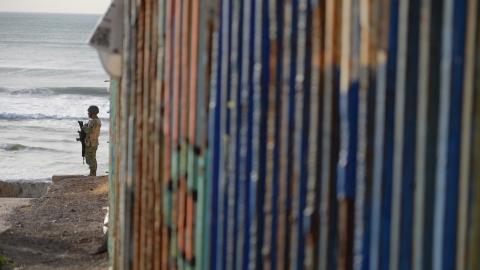
The U.S. military guards the wall that divides Tijuana, Mexico, and San Diego, California, which borders the Pacific Ocean. A survey by the Colegio de la Frontera Norte and the International Organization for Migration reveals that between July and November 2022, 69,110 Mexicans were returned by U.S. authorities. (Jorge Nieto)
Many activists and advocates for migrants have called for more effective actions to protect this community, since they claim that they are among the most vulnerable groups.
At the 30th annual Posada Sin Fronteras — celebrated at the wall that divides Mexico from the United States, facing the Pacific Ocean, in the Playas de Tijuana neighborhood — Murphy, director of the Casa del Migrante, highlighted the presence of organized crime in his rousing speech, and denounced how bribery and extortion against migrants has increased right in front of the authorities, without them being able or willing to do anything about it.
"Who is in control? Organized crime," the priest asserted on Dec. 9, 2023. "I believe we are in a very dangerous moment for migrants, and also for the people of Tijuana, because crime is well-organized, more so than the government," he added.
For Paoletti, coyotes are only one link in a very large chain of corruption, making it "an established business that trades people.”
"It gives the impression that it's a very hidden thing, but at this point it's not hidden at all. Everyone knows who the coyotes are, where they pass through, what their routes are, how much they charge or how much they pay, because they also pay those to cross who will follow,” the 73-year-old sister said.
"It's all armed corruption; it gives the impression that it's just the coyotes because they get the notoriety, but how many people are involved in that trafficking, in that illicit trafficking of migrants?" she added.
'The strength of motherhood'
Paoletti, whose parents emigrated from Italy along with her and her eight siblings, reflects on the guts women show in the face of adversity.
"Migration puts women in a condition of vulnerability, but we are not vulnerable; we are the ones who suffer most from situations of vulnerability," she said.
"Do you know what it's like for a woman to have to uproot her children out of their home, and to have to tell them that they are going to visit grandma so they can get out in time before organized crime arrives? Do you know what it's like to have to hide your children so you can escape? That is the strength of motherhood," she said.
In 2010, the proportion of female migrants was 2 out of 10; since 2018, 4 out of 10 migrants, in certain regions, are women traveling alone or with their children, said Oscar Misael, an anthropologist who has focused his doctorate research on gender migration and organized crime.
In an interview with GSR, Misael explained that migrants are usually escaping organized crime or a precarious economic situation; he added that the phenomenon of caravans and intercontinental migrations represents "the exodus of misery," a reference to a term coined by sociologist José Manuel Valenzuela.
Paoletti recalled the case of a woman who was kidnapped by organized crime, along with her three children, and was forced to cook for 30 hired hitmen.
"She lived in such a terrible situation that she had to start plotting; she had to think about how she was going escape that place," said Paoletti, who added that she and her children "managed to escape and to get a ride on the highway, a form of travel that is also very dangerous."
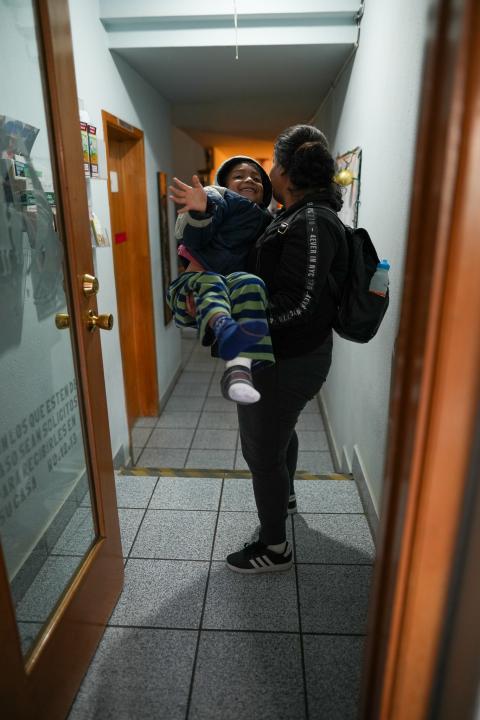
At the Instituto Madre Asunta, a team of specialists and volunteers receives, listens to, and identifies the needs of migrant women, whom they guide in the search for solutions to their needs. (Jorge Nieto)
'They also mark my life'
In this context of constant tragedy, struggle, and endemic violence, is there anything that could fill this sister with day-to-day happiness? Before responding, Paoletti asked, "Just any given Monday?" She pauses, looks up, reflects, and offers an answer: "To arrive in the evening and know that some people are happier — people who maybe bathed, ate, and are now in a safe place."
"One day as I was leaving, there was a mother wanting to enter with her 7-year-old child, and the child asked her, 'Are there any beds here?' That a child asks a question like that shows the pain and the weight they carry. It is astounding," the Scalabrinian sister said.
A religious sister for 52 years, Paoletti sees her time at the head of the Instituto Madre Asunta shelter as a closing or finishing touch to her vocation.
To the migrants, who she accompanies 365 days a year, 24 hours a day, she leaves a message: "I am not closing the door and leaving, but when I leave, I take the institution home with me, and vice versa. You are very significant for my choice of life. For my consecration you have been a renewal, and the fact that many people pass through my life, and I through theirs, implies that they also mark my life and make me think and live differently."
This story was originally published in Spanish on Feb. 12, 2024.
'One day as I was leaving, there was a mother wanting to enter with her 7-year-old child, and the child asked her, 'Are there beds here?' That a child asks a question like that shows the pain and the weight they carry.'
—Sr. Albertina Maria Paoletti



